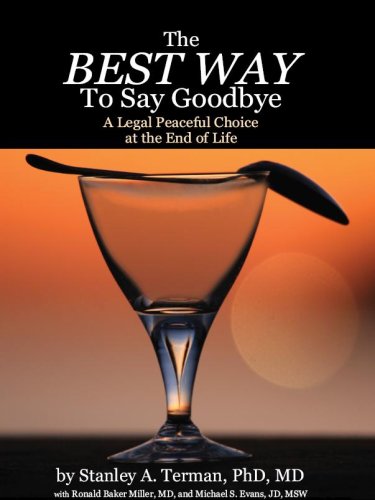Items related to The Best Way to Say Goodbye: A Legal Peaceful Choice...

What makes the process peaceful? Knowing how to control thirst. (The author went on two fasts himself to learn what works.) In addition, good discussions with family members before beginning. Consistent with the principles of some religions, this method is available even for patients who are physically too sick to put a lethal dose of medication in their mouths and swallow.
By creating strategically effective documents for a trusted agent or proxy to withhold Food & Fluid on the patient's behalf, this way to Permit Natural Dying can actually extend the quality of life of those with early dementia. They can enjoy living until they reach a point they have previously described in behavioral terms (perhaps with help from using one of the book's forms).
Beyond serving as an authoritative source of information to strive for an ironclad strategy for dementia, the book endorses life's most ironic fact: When people know they can control when they die--they can, and often do--choose to live longer.
Poignant memoirs illustrate its practical guidelines and useful forms; for example, why Proxy Directives are more effective than Living Wills, and how to make Living Wills work better if they are the only available choice.
The book-within-a-book format of this book is as unique as its content is comprehensive. Over 300 citations, an index, a glossary, and further resources... yet its core reading is user-friendly for all. The subject matter is lightened by 22 cartoons and humorous stories; deepened by provocative discussions of the secular meaning of Sanctity of Life ; and broadened by considering the emotional, practical, clinical, legal, moral, ethical, religious, spiritual, and political aspects of a subject that will affect absolutely everyone.
"synopsis" may belong to another edition of this title.
Start at the beginning and read everything, or if you prefer. . .
A) Read the book-within-a-book. Page 4 explains how to skip flagged portions to reduce the number of pages to just over 300.
B) Focus on Patient Stories and Legal Cases for discussion, Humorous Stories for fun, or Guidelines and FORMS for personal planning. The Table of Contents list all these Titles on pages xxv through xxx.
C) For a quick overview, read ten pages: "She revised her Advance Directives from age 16 to 86," and "Which documents do I need when?" on pages 383-389; and The Seven Principles of Good End-of-Life Decision-Making on 427-429. View thirst-reducing products on 104.
D) Delve into such general topics as the medical, legal, religious, or family aspects of end-of-life planning. The Table of Contents can guide your choice of chapters.
E) Implement a legal alternative to Physician-Assisted Suicide. You can avoid prolonged unbearable pain and suffering at the end of life as long as you are mentally competent. Read the answers to questions D, & numbers 1-9, 16, 19, 20, 32, 34, 36, 38, & 40.
F) Prevent years of indignity & dependency from Alzheimer's disease, vegetative states, or persistent unconsciousness. Learn how to set the stage now so others will honor your wishes in the future, if you no longer can speak for yourself. Read Chapter 3 and the answers to questions numbers 20-22, 25-31, 40, 41, and 43-45.
G) Expand your knowledge.
In working with terminally ill patients and their loved ones, Dr. Terman regularly assesses the judgment and ability to make decisions of patients who wish to create strategic Living Wills and Powers of Attorney for medical or financial decisions. He also provides advice and support for individuals designated as Proxies when they are faced with the awesome responsibility to make an end-of-life decision for another.
Having participated actively in three bioethics committees and consulted at the San Diego Hospice, Dr. Terman now lectures to professional and general audiences. A sample of topics from this book includes: "Moral Paternalism and The President s Council on Bioethics," "The Sanctity of Many Lives," and, "Does Hollywood Accurately Portray Alzheimer s disease?"
Dr. Terman believes educating people on the legal, peaceful choice to refuse food and fluid has potential to help far more people than expensive political campaigns to attempt to legalize Physician-Assisted Dying, which cannot help millions of people avoid their greatest fear: progressive indignity and dependency from such devastating diseases as Alzheimer's.
Attorneys for Terri Schiavo s parents submitted Dr. Terman's declaration to Florida's Judge George Greer. Dr. Terman agreed to participate in the spirit of two beliefs he holds most dear: "We are morally obligated to honor a patient s previously expressed wishes," and, "We should do everything possible to learn directly from the patient, what she or he wants."
Dr. Terman is currently creating a series of books, audio CDs, and DVDs in the series, The BEST WAY to Attain Peaceful Transitions. He is also the author of Lethal Choice, a medical thriller based on a conspiracy theory of Physician-Assisted Suicide that explores end-of-life ethical principles. He lives in San Diego with his wife and their two Pomeranian dogs.
Ronald B. Miller, MD, is Emeritas Professor of the Program in Medical Ethics at the University of California, Irvine College of Medicine.
Michael S. Evans, JD, MSW, is an attorney and social worker who has served for over fifteen years as legal advisor to several right-to-choose-to-die organizations.
"About this title" may belong to another edition of this title.
- PublisherLife Transitions Publications
- Publication date2008
- ISBN 10 1933418028
- ISBN 13 9781933418025
- BindingHardcover
- Edition number1
- Number of pages489
- EditorRonald B Miller MD, And Michael S Evans JD MSW
(No Available Copies)
Search Books: Create a WantIf you know the book but cannot find it on AbeBooks, we can automatically search for it on your behalf as new inventory is added. If it is added to AbeBooks by one of our member booksellers, we will notify you!
Create a Want
